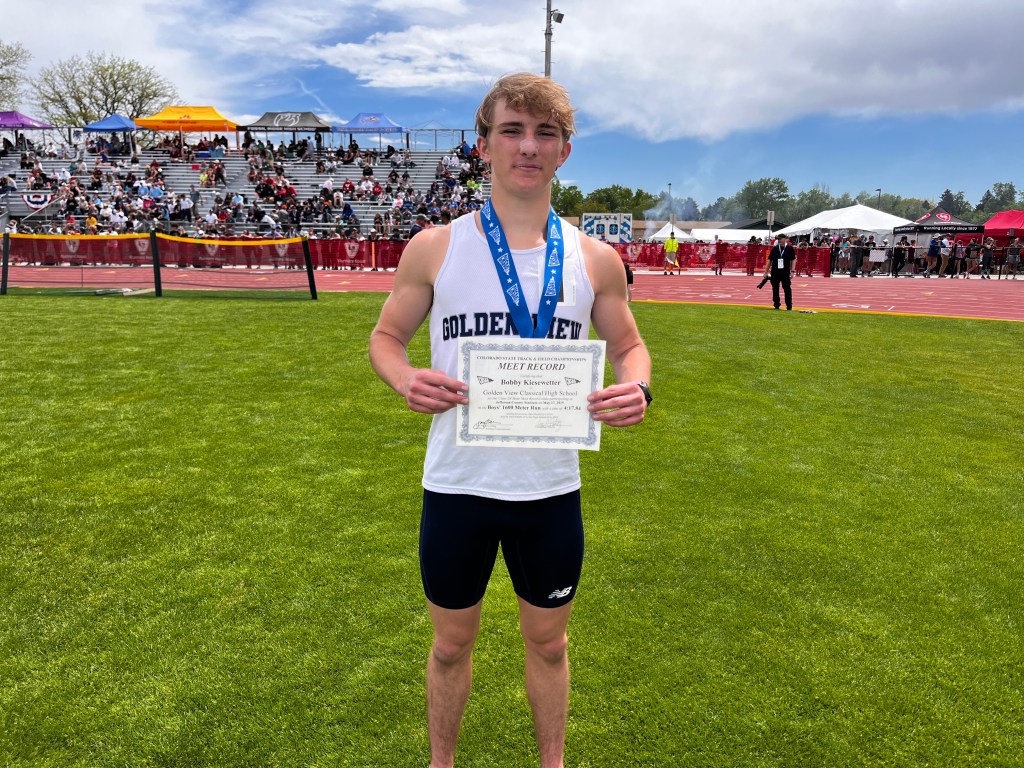Before every race, these days, Golden View Classical’s Bobby Kiesewetter sits and tries to prime his mind against a body that might fail him.
Deep breaths. One. Two. A warrior mindset, he calls it. The message to himself is simple and lighthearted because anything truly serious could induce panic.
Yeah, your throat’s closing. It doesn’t matter.
On Saturday, he burned to a Class 2A state meet-record time of 4 minutes, 17:84 seconds, in the boys 1,600 meters, with only a slight hint of the burning throat that had thrown askew a promising career in distance running. Bronchitis tanked any chance the senior had at cross country state championships in the fall. The winter was worse. His throat would constrict, his workouts a haze of exhaustion. Kiesewetter started taking asthma medication that didn’t work.
Flummoxed, he saw an Instagram post from fellow standout Colorado distance runner Benjamin Anderson, describing an unusual breathing condition that had hit him the same. With little other option, Kiesewetter sent a message — a “shot in the dark,” he called it — to Anderson, a senior at Mountain Vista.
“It means a lot to me that someone was like, ‘Hey, I saw you struggle through this, you got through it, how could you help me?’ And it was an honor to help him,” Anderson reflected.
They call it EILO. Exercise-Induced Laryngeal Obstruction, for long. Vocal cord dysfunction, for simple. It’s somewhat newly defined in the medical community, hence Kiesewetter’s confusion. It’s also fairly common: The National Library of Medicine pinpointed its prevalence between 5% and 10% of adolescents and young adults. Anderson referred Kiesewetter to several doctors — the same ones he was referred to by a coach who once noticed him laboring during a workout and remarked, “Dude, you can’t breathe.”
The physical rehab for EILO, as both Kiesewetter and Anderson experienced: Sticking a camera attached to a cable up the nose and down the back of the throat, monitoring vocal cords, and physically retraining breathing.
Awful, Kiesewetter put it. Still nowhere near the most difficult aspect of this strange journey.
This was completely unpredictable, Anderson advised Kiesewetter. Completely uncontrollable. The more you focused on it, the more stress it induced and the worse it got. Anderson, who finished third in the 5A 1600 Saturday, meditates every night to quell his fear. Kiesewetter does his meditations, of sorts, before races.
He didn’t fully get over that mental hump, Kiesewetter said, until a month ago. Still, he entered Saturday as the top-seeded runner in the 2A 1,600 field.
He heard footsteps fade behind him down the stretch, and adrenaline took over, no thoughts of his windpipe clouding a record performance.
“Just thug it out, man,” Kiesewetter smiled.
Want more sports news? Sign up for the Sports Omelette to get all our analysis on Denver’s teams.


